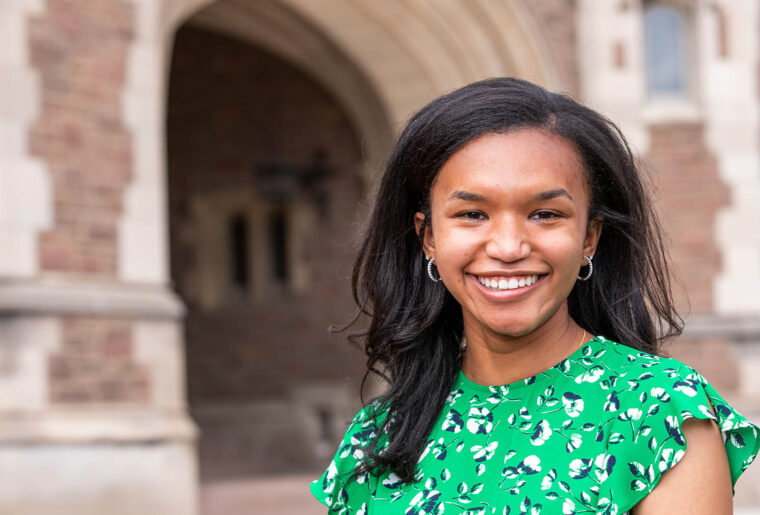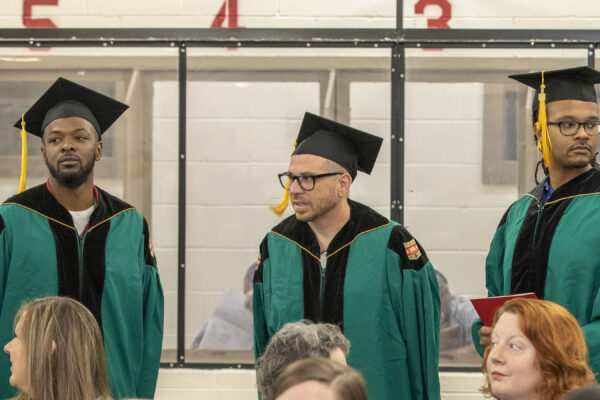Kennedy Young, a junior at Washington University in St. Louis, used to believe that only bad people went to jail.
“I didn’t understand the prison system and how it disproportionately impacts poor folks and people of color,” said Kennedy, who grew up in Little Rock, Ark.
Then Young watched “13th,” a 2016 documentary that examines the racist roots of mass incarceration in America. The film helped her understand why some of her own family members had been incarcerated and inspired her to conduct research in her community. Young interviewed a judge who wanted to eliminate cash bail; a sheriff resigned to the nation’s staggering incarceration rate; a corrections officer who refused to define the incarcerated by their crimes; and formerly incarcerated individuals struggling to find work.
“The more I learned, the more I realized that I needed to dedicate my life to addressing these injustices,” Young said.
At Washington University, Young has done just that. Young is a teaching assistant and tutor for the Prison Education Project (PEP), which delivers college-level courses to incarcerated people at the Missouri Eastern Correctional Center (MECC) in Pacific, and is co-founder of the St. Louis Reentry Project, an organization that gives formerly incarcerated people money for clothes, housing and other basic needs. As a Mellon Mays Fellow, Young is researching the prison system’s rippling impact on families and communities. In addition, Young has completed internships for ArchCity Defenders, a local holistic legal advocacy organization, and for the Federal Public Defender’s Office, Eastern District of Arkansas.
Young will be honored for this bounty of work with a Gerry and Bob Virgil Ethic of Service Award during a virtual ceremony at 6 p.m. Wednesday, April 21. The annual event is hosted by the Gephardt Institute for Civic and Community Engagement and celebrates members of the university community who exemplify a character of service and engagement with the St. Louis region.
“Kennedy was the one PEP students turned to for support, and I think it’s because she is a great relationship builder and people could trust her,” said Geoff Ward, professor of African and African American studies in Arts & Sciences. Ward worked with Young at MECC and on various research projects. “She has this wonderful inclination to jump in and do her part, whether that’s a class in a prison or an archival trip to South Carolina.”
As a teaching assistant, she traveled to MECC once a week to help students write their critical essays. Once COVID-19 hit, Young started a virtual summer book club for PEP and Danforth Campus students. Together, they discussed selections from “Octavia’s Brood,” an anthology of social justice science fiction.
“The book club allowed us to reimagine the world collectively, not as PEP students or Danforth students, but WashU students,” said Young, who is studying sociology and African and African American studies in Arts & Sciences. “I live by this quote: ‘Talent is universal, but opportunity is not.’ That’s why it’s important to think about how we increase access to opportunity so that people have the chance to reach their fullest potential.”
Young’s work with incarcerated students exposed her to the challenges that many people face upon release. With Jami Ake, assistant dean in Arts & Sciences, and other community volunteers, she helped launch the St. Louis Reentry Collective, which publishes a comprehensive resource guide and raises money via community fundraisers. Young gets that many of the people she serves did, in fact, commit crimes. But so what, she asks?
“I don’t understand why people think it’s OK to put someone away 10, 15 years, but not think about how to prepare them to come back to society,” said Young, who ultimately plans to earn her JD/PhD and would like to teach law and lead a reentry clinic. “Our prison systems preys on people of color and poor people and sets them up to fail. And we have to do better at creating networks of support and care so that formerly incarcerated people can thrive after prison.”



Comments and respectful dialogue are encouraged, but content will be moderated. Please, no personal attacks, obscenity or profanity, selling of commercial products, or endorsements of political candidates or positions. We reserve the right to remove any inappropriate comments. We also cannot address individual medical concerns or provide medical advice in this forum.